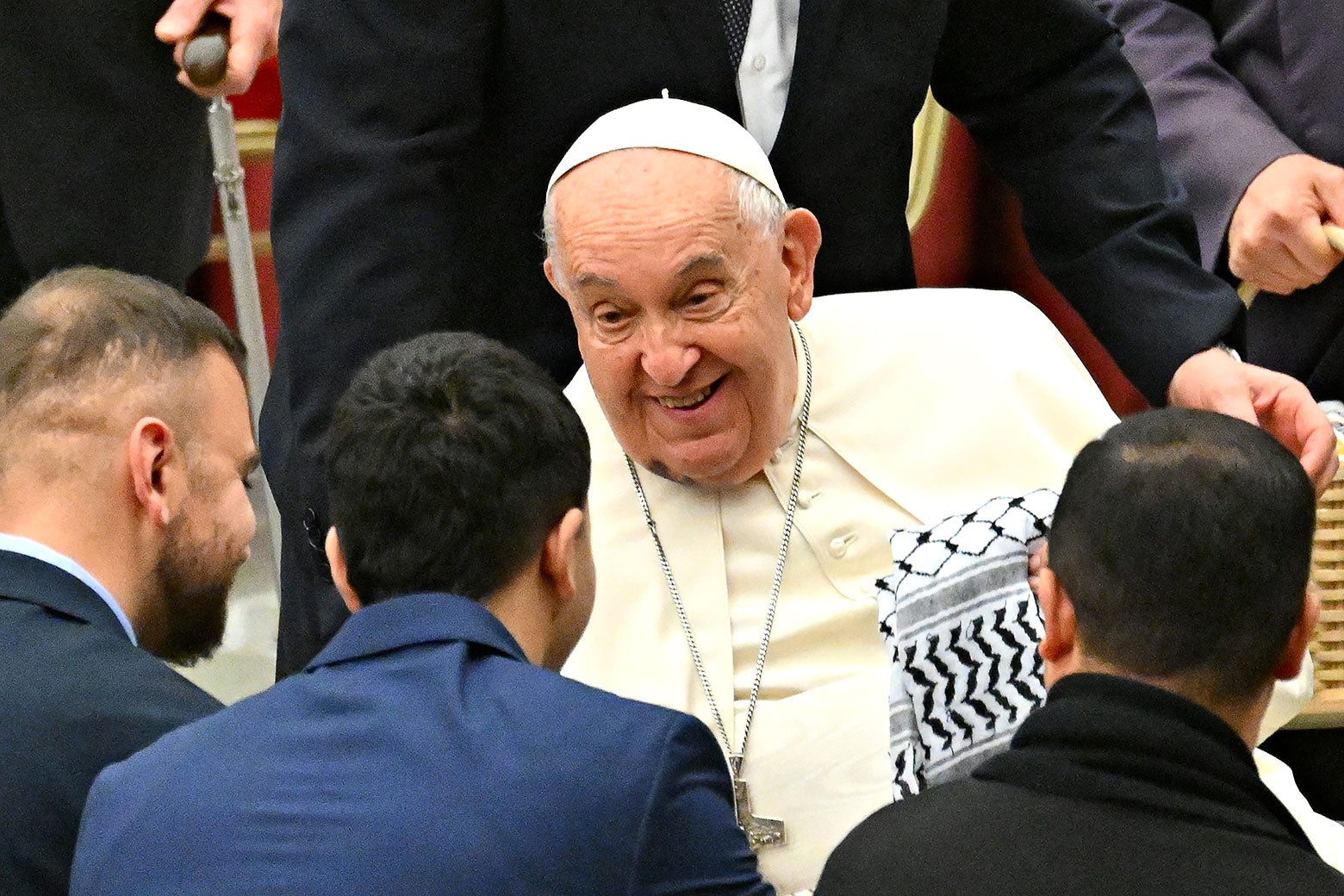He’s on a roll of year-end power moves.

Andreas Solaro/AFP via Getty Images
Sign up for the Slatest to get the most insightful analysis, criticism, and advice out there, delivered to your inbox daily.
Pope Francis has had quite a notable month. Last week, the Vatican announced that Mercedes-Benz had given him a fully electric Popemobile, as part of the Vatican’s goal to make all of its vehicles zero emissions by 2030. And on Saturday, Francis unveiled two Nativity scenes for the holidays: one, in St. Peter’s Square, imagined with Italian fisherman’s huts; and another, in a Vatican audience hall, depicting the Christ child in a cradle made from a kaffiyeh.
“Enough with wars, enough of violence,” the pope said during the unveiling, which was attended by Palestinian ambassadors to the Vatican. The scene had been crafted by two artists from Bethlehem, the birthplace of Jesus Christ, which is today a Muslim-majority city in the Israeli-occupied West Bank.
Francis hasn’t been silent about Israel’s war in Gaza; in November, he called for an investigation into whether Israel was committing genocide. But the display of the kaffiyeh, a symbol of Palestinian national identity, was perhaps the clearest message he has yet sent about his sympathies for the Palestinian people.
The pope is about to turn 88, and it seems he may—as he ponders his legacy—be caring a bit less about what his critics think. For progressive Catholics, the week in Vatican news was promising.
But the most promising piece of news for these Catholics was neither the Popemobile nor the kaffiyeh, nor even his plea for the U.S. to stop executing prisoners, but a recent hiring spree.
In a ceremony on Saturday, Francis formally welcomed 21 new cardinals into the church’s top leadership rank. It was the 10th time in 12 years that he has elevated another crop of cardinals, which means he has named 110 of the 140 men currently eligible to vote for the next pope.
In doing so, he has all but guaranteed that his successor will not be a conservative Italian looking to restore the church’s medieval character; the cardinals who will vote at the next conclave come from all over the world and have very different approaches to engaging with modern society. A couple of the new cardinals have even refused the cardinals’ signature red vestments—choosing, in Francis’ model, to wear modest clothes as a symbol of humility.
Popes tend to appoint cardinals they see as allies; it’s not unusual to staff the College of Cardinals with ideologically aligned clerics. But Francis, who is from Argentina, has done it at such a rate that it seems he’s determined to remake the church into a less European institution. According to the National Catholic Reporter, Francis has elevated cardinals from almost 30 countries that had never before been represented in the college.
A new Brazilian cardinal told reporters on Saturday that the cardinals must advance “a church that is closer to the people, a church that is simpler, a poorer church.” A couple of days before that, the recently elevated Ukrainian Greek Catholic cardinal living in Australia promised to advocate for Ukraine and stressed that Russia “should be punished.” A new British cardinal is famous for challenging the church to embrace LGBTQ+ acceptance and more rights for women in the church; he told reporters that “all the church offers is love.”
There have been plenty of moments when progressive Catholics have been disappointed by Francis’ leadership, including when he was defensive about a Chilean bishop accused of sexual abuse. Or when his much-hyped and multiyear Synod of Bishops (basically, a large leadership meeting) concluded without any radical changes on the matter of female leadership or LGBTQ+ Catholics’ rights. Or when the Vatican declared that “sex changes” and “gender theory” were threats to society. Or when Francis—while cautioning against admitting gay men into the priesthood—allegedly used a homophobic slur, twice. (Francis’ defenders have argued that because he was not speaking in his native language, he had made a genuine mistake. “The Pope never intended to offend or express himself in homophobic terms,” the Vatican said, in a rare apology. Critics noted that the original argument was itself still homophobic.)
But Francis’ controversies have more often stemmed from his efforts to shake up the centuries-old institution. In 2013 he famously asked “Who am I to judge?” regarding a gay priest. Last year, he allowed priests to bless people in same-sex relationships. He has said transgender people can be godparents and witnesses at church weddings; he has washed the feet of Muslim and Christian prisoners. He is so widely reviled by radical traditionalist Catholics that some conservative Catholic groups have launched a multiday event to pray for the pope’s “conversion.”
If Francis fails to live up to his own ambitions for his papacy, he may hope that his successor, picked by his allies, can be even bolder. On Saturday, Francis elevated the first cardinal of Palestinian origin. The cardinal, who is based in Chile, has promised to push for peace in Gaza.
Get the best of news and politics
Sign up for Slate’s evening newsletter.
Discover more from CaveNews Times
Subscribe to get the latest posts sent to your email.
























![Exploring the Serene Beauty of Nature: A Reflection on [YouTube video title]](https://cavemangardens.art/storage/2024/04/114803-exploring-the-serene-beauty-of-nature-a-reflection-on-youtube-video-title-360x180.jpg)





















